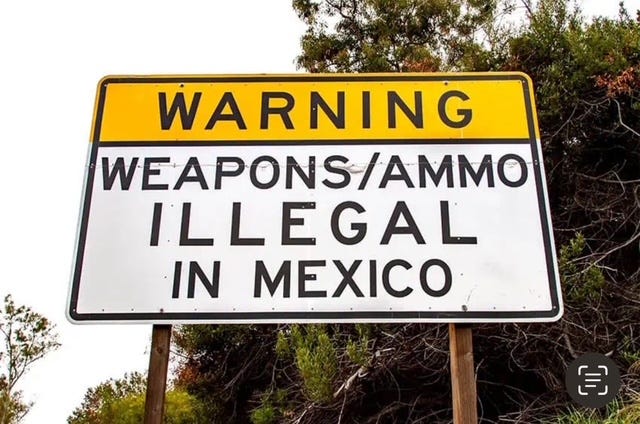Personal Report from the Border
The commonplace narrative about the border is completely backwards. It is Mexico that faces great danger thanks to its proximity to the United States.

I am a natural-born U.S. citizen, but for the first time in my life I am nervous about entering my country of birth from abroad.
Last week I made a short trip to San Diego. From my current home in Central Mexico, the cheapest and easiest route was to fly to Tijuana and then walk over the border into San Diego via a special pedestrian bridge known as the Cross Border Express.
I’m a longstanding advocate for the rights of immigrants, a former immigration lawyer and law professor, and a frequent writer about U.S. immigration policy. Especially under Trump 2.0, I’ve written a number of blog posts (and “liked” on social media many posts and articles written by others) that are sharply critical of the federal government’s actions with respect to immigration (and other matters as well).
As a result, my friends and family expressed concern about me returning to the United States. Would U.S. Customs and Border Protection (CBP) pull me into a back room and interrogate me? Confiscate my phone and computer? Disappear me?
How has it come to this?
Most of the recent incidents of people being interrogated or detained when seeking to enter the United States legally have involved tourists or students, though some visa-authorized workers and permanent residents have also been questioned or even denied entry. However, I have heard of at least two U.S. citizens who were taken into secondary inspection by CBP and questioned closely. In both cases, the individuals were the attorneys of record for immigrants with open deportation cases that were being actively litigated.
It would not be legal for CBP to deny a U.S. citizen entry into the United States. But they can question you, and confiscate your electronic devices. And honestly, illegality doesn’t seem to matter to this administration. Look at how they are openly flouting court orders to justify the removal of hundreds of Venezuelans to a prison camp in El Salvador, or to bring back to the United States a Salvadoran migrant (Kilmar Abrego Garcia) whose deportation they have acknowledged was an “administrative error.”
Spoiler alert: I entered the United States from Mexico with no problem.
But riding in a taxi back to the border crossing three days later, I was surprised to see a sign on the highway that said:
“WARNING: WEAPONS/AMMO ILLEGAL IN MEXICO”
It was a reminder that the commonplace narrative about the border is completely backwards. It’s not that the migrants seeking safety (or even simply seeking work) north of the border pose a threat to the United States. The U.S. has historically held itself out internationally as a safe haven for the persecuted, and the vast majority of asylees and refugees have gone on to raise families, work hard at difficult jobs (or create successful businesses of their own), and become upstanding members of their communities.
More practically, without immigrants, the United States population would be experiencing a deep decline, as the birthrate among natural-born citizens is below replacement levels. The most recent demographic data shows that immigration accounts for the entire growth of the U.S. population year over year. Shutting down immigration would have a seriously negative impact on the U.S. economy.
It is Mexico that faces great danger thanks to its proximity to the United States. Military-style weapons manufactured in the United States are frequently smuggled into Mexico, where they fuel drug cartel violence. In fact, the Mexican government has filed a lawsuit seeking to hold U.S. gun manufacturers liable for the marketing of illegal guns to Mexico. But in recent oral arguments before the U.S. Supreme Court, members of the Court expressed skepticism about Mexico’s specific legal claims. As a result, it is likely that the Supreme Court will block the lawsuit.
I’m not sure what more Mexico can do to stem the arms smuggling trade. But it seems pretty clear that despite all of the rhetoric, none of the recent changes to U.S. immigration policy will achieve the government’s stated ends — nor are they actually meant to do so. Immigrants are simply being used as pawns in an ideological push by oligarchs seeking to usher in an authoritarian form of government.
The Trump regime’s dismantling of the rule of law and the social contract will lead (and has already led) to widespread suffering by average people in the United States. But it is immigrants who will inevitably suffer the most.




